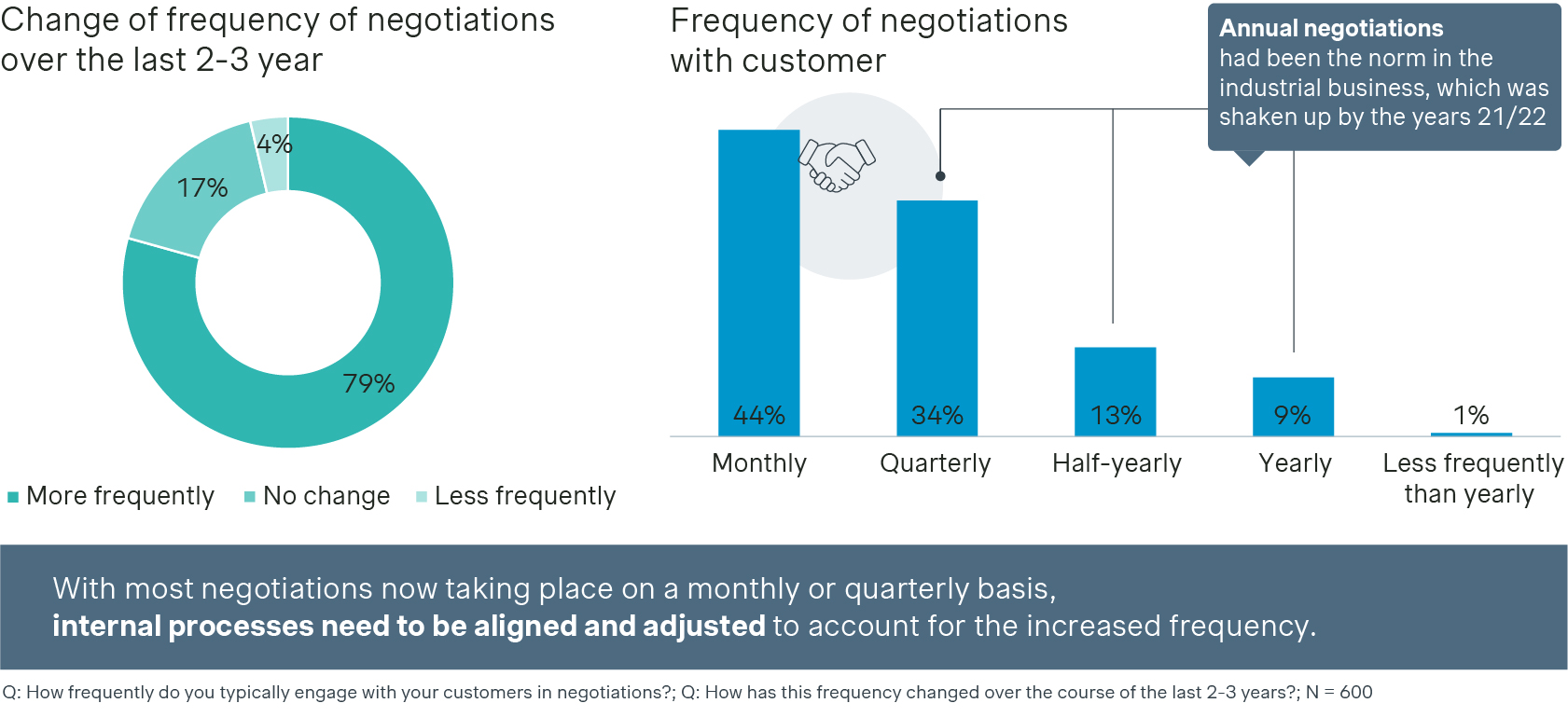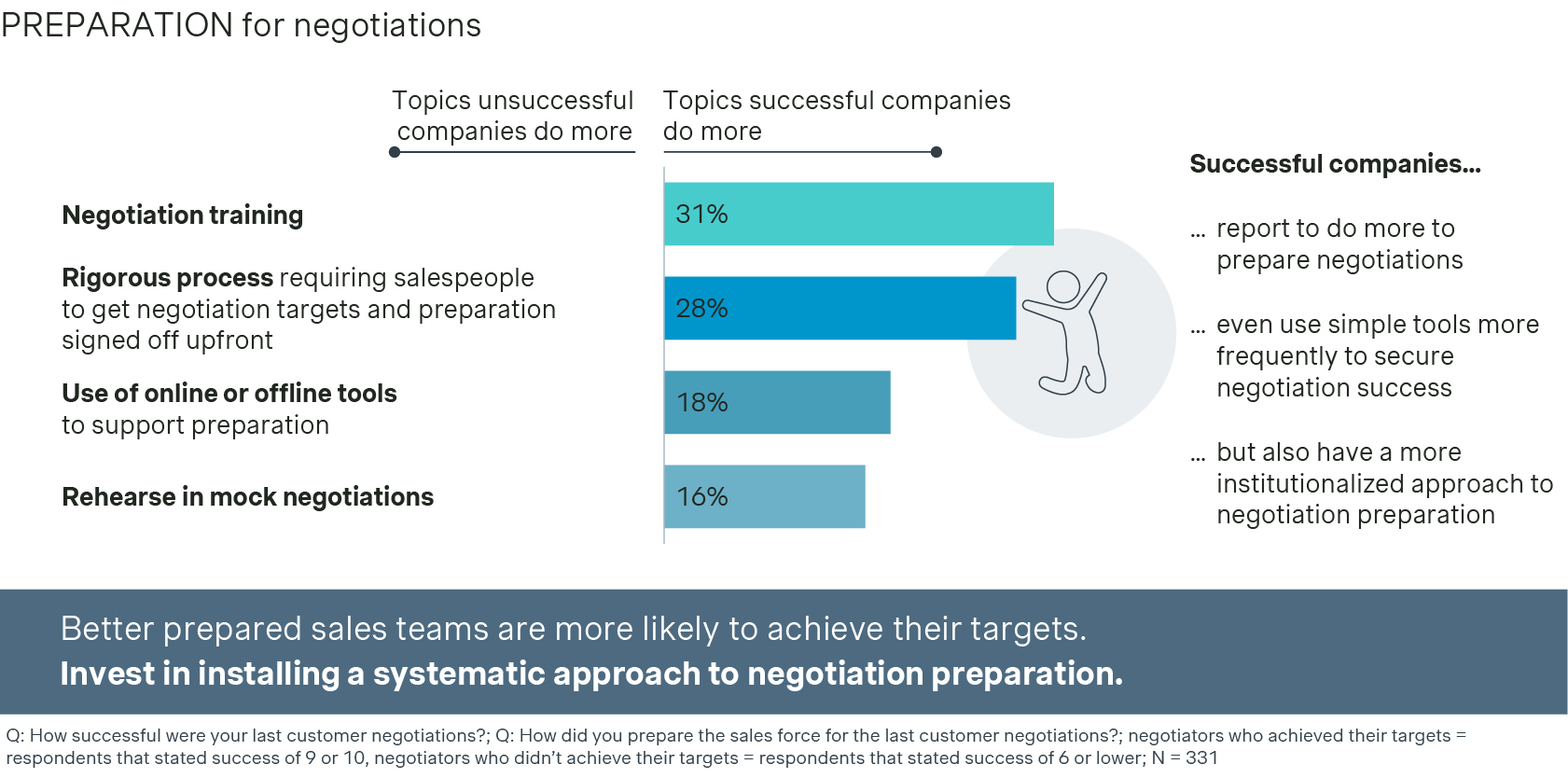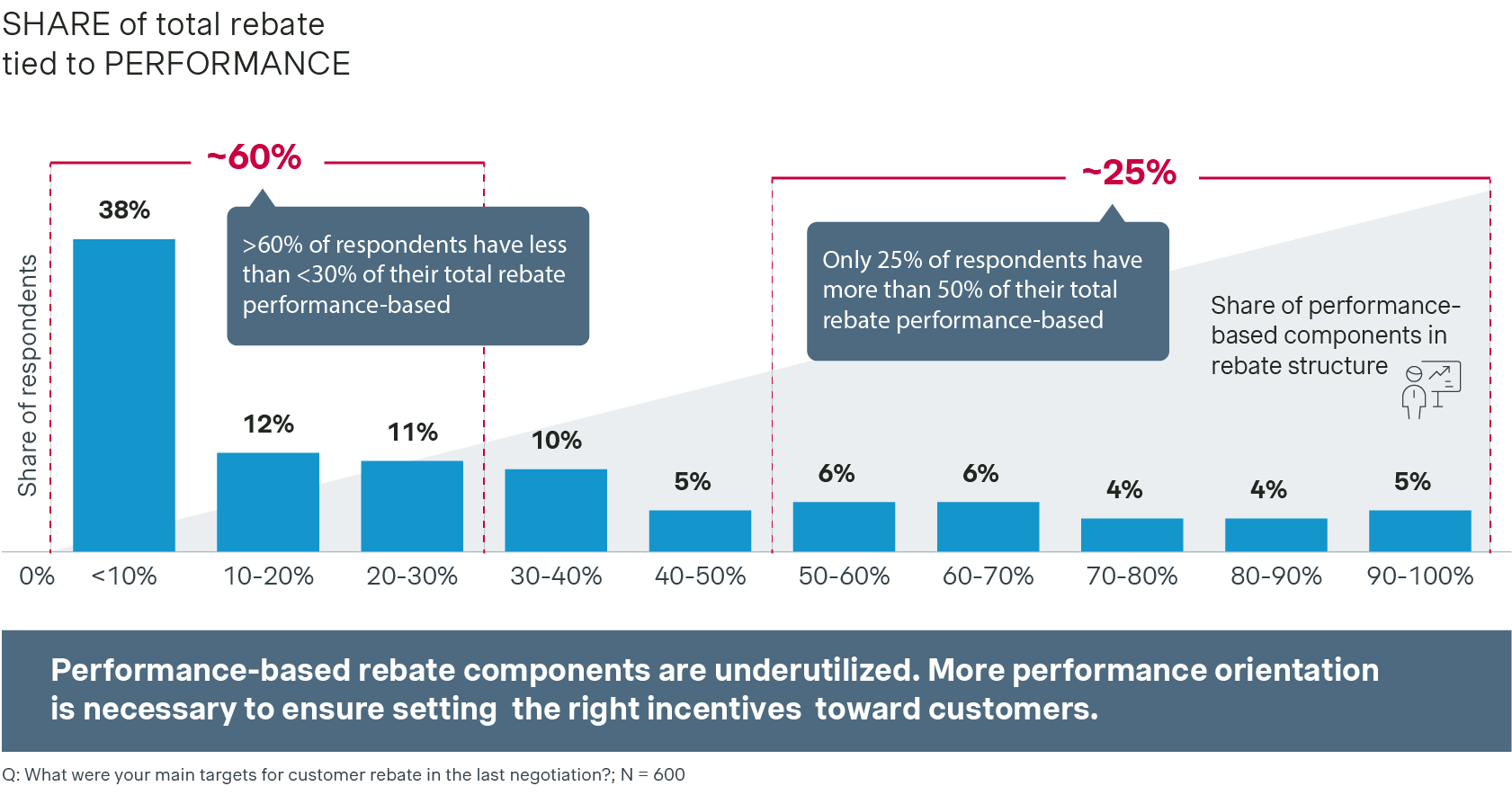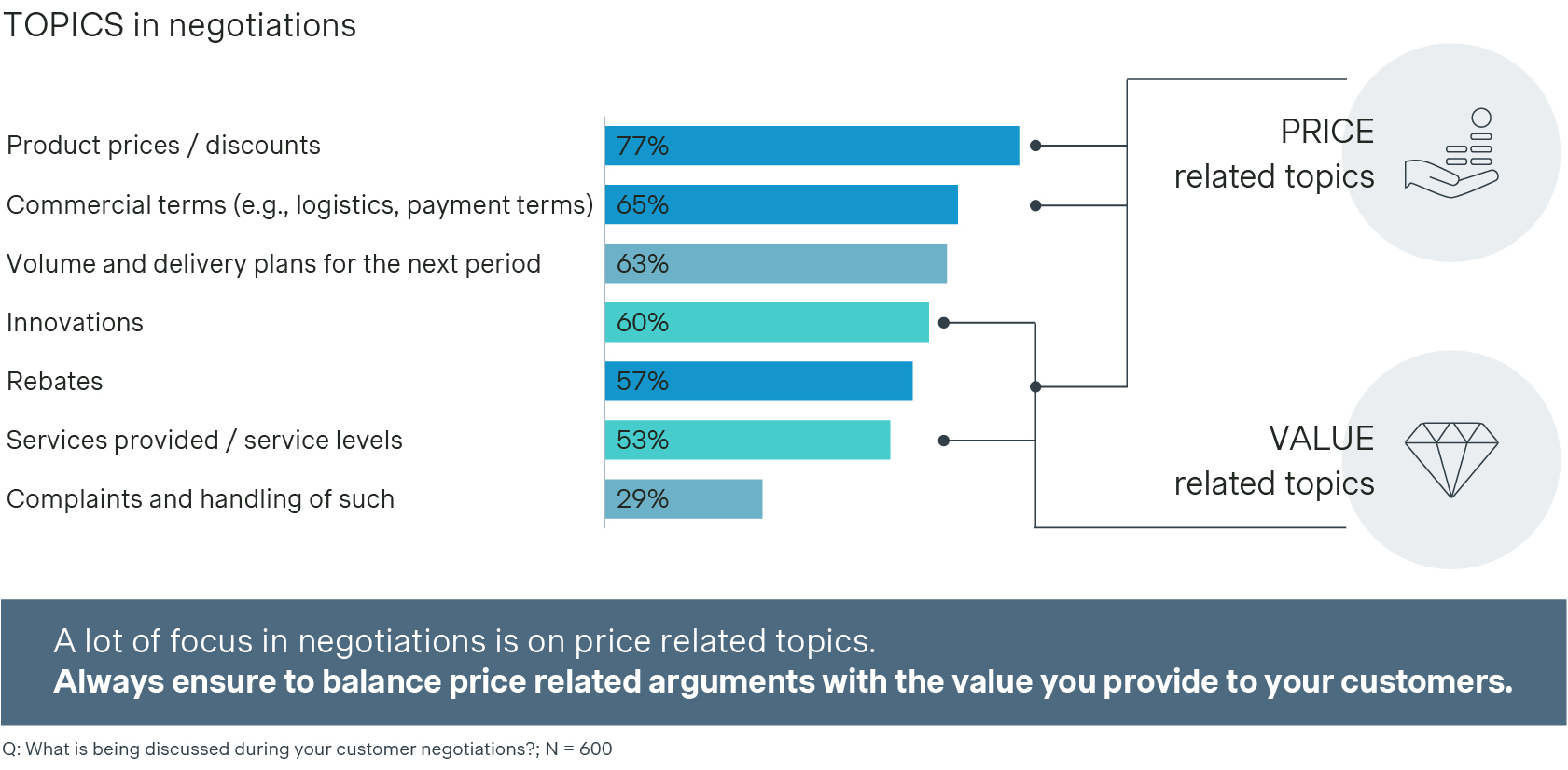Explore why and how to revamp your sales negotiations and B2B rebate strategies for better results.
Current realities of B2B sales negotiations and rebates.
Traditionally, companies use the fall season to negotiate terms, secure rebates for the coming year, and announce planned price increases—until the COVID-19 pandemic and the Ukraine war disrupted this pattern. Since then, fluctuating demand, rising interest rates, and volatile raw material costs have reshaped the way negotiations are conducted.
In our Global Negotiation and Rebate Study 2024, we surveyed 600 B2B companies across 13 countries to understand the key challenges for sales in 2025. This study also explores which strategies and adaptations are necessary to negotiate effectively and strengthen existing customer relationships.
Our findings reveal significant shifts in B2B sales negotiations dynamics, with 79 percent of companies reporting much shorter negotiation cycles. While the norm has been annual negotiations pre-COVID, now it has changed to monthly or quarterly negotiations. Companies accustomed to manual, once-a-year price adjustments have found this challenging. To keep pace with changing market needs, agile and system-supported processes are essential for quick and accurate adjustments.

The study also reveals that customer rebates, as a longstanding component of B2B sales terms to reward for growth in purchase volumes, have lost their connection to customer performance. Over 60 percent of the surveyed companies indicate that less than 30 percent of their rebates are performance based, while 76 percent report that rebates have increased over the last years.
So how can companies respond effectively to master the challenging conditions?
Four steps for a systematic negotiation and rebate management.
1. Be better prepared: Institutionalize negotiation preparation
Our study results show that many negotiators feel constrained by external factors in today’s volatile economy, often missing targets as a result. However, our Global Negotiations and Rebate study highlights a key differentiator: companies that consistently meet their targets have a more institutionalized approach to negotiation preparation. Successful companies report higher levels of negotiation training (31 percent), better defined processes (28 percent), and the use of tools to ensure readiness (18 percent), with rehearsals further improving performance (16 percent). The message is clear—establishing structures and governance in the organization to ensure thorough preparation by negotiators is key to achieving better outcomes.

2. Implement a more performance-driven rebate structure
One of the key purposes for B2B rebates is to incentivize the customer to purchase additional volumes. However, this function can only be fulfilled if the rebate is tied to concrete performance targets. According to our study, less than 30 percent of companies tie rebates primarily to performance metrics. Therefore, these rebates are implemented more like a discount rather than rewarding customers for pursuing more sales. Additionally, structural uncertainties also lead to increased rebate payouts. For example, fewer than half of companies exclude non-product sales, such as cash discounts, freight, and service revenues, from their rebate calculations. To address this, companies urgently need to review their rebate structures and align them more closely with customer performance.

3. Streamline the rebate structure for greater efficiency
Rebate management grows increasingly complex with each additional rebate element. The survey shows that most companies use between two to six rebate elements per customer. Four and five elements are the most common, used by 17 percent and 18 percent of respondents, respectively. However, managing more than four elements efficiently often proves challenging. This complexity not only makes rebate management cumbersome but also obscures the true effect for both sellers and buyers. For sellers, it becomes difficult to understand the impact of adjustments to individual rebate elements on the overall price. For buyers, overly intricate structures hinder transparency, reducing price clarity and diluting the intended incentives.

4. Make it multidimensional: Focus on more than just price negotiations
In many of the conducted negotiations, price is the key topic being discussed. Our study reveals that out of the top five negotiation topics, three revolve around price, while only one is value centric. Currently, as raw material costs decrease, customers are demanding price reductions, but sellers are forced to raise prices due to increasing labor costs and inflation to maintain profitability. In this situation, moving beyond price-centric discussions is critical to avoid having a clear loser in the negotiations. Value-based considerations, such as innovations and service levels, offer the opportunity for both parties to end negotiations with mutually satisfactory outcomes.

Recap: What successful companies do
Successful companies excel in negotiations and rebate management by taking a structured, proactive approach. Making immediate adjustments to your processes is essential, and here are the key fundamentals:
- Be better prepared: Institutionalize negotiation preparation
- Implement a more performance-driven rebate structure
- Streamline the rebate structure for greater efficiency
- Make it multidimensional: Focus on more than just price negotiations
What sets these companies apart is their commitment to consistently implementing these actions and strategies. These companies view negotiation as a skill that can be managed and improved, emphasizing the importance of structure and continuous training—an approach proven to yield better outcomes according to our study.
How Simon-Kucher can support your negotiation and rebate management strategy
Simon-Kucher brings deep expertise to help suppliers master negotiation management and optimize their rebate program. Our comprehensive solutions include detailed B2B negotiation support that covers designing playbooks, sales team training, and the right tools to empower your teams. Successful companies understand that a negotiation training or providing a sales playbook isn’t enough. This alone won’t build a team of skilled negotiators. Ongoing learning, training, and application are necessary. From value articulation right through to the selling process, our practical tools and techniques ensure you are prepared for high-stakes negotiations that deliver successful outcomes for your business.
We have worked with many clients to bring performance orientation back to their rebate systems and restructure them to manage inherent complexities, benchmarking against industry standards. Starting with a thorough status assessment, we then recommend tailored optimizations for your rebate structures for effective rebate management.
If you’re interested in a structured, data-driven approach toward sales negotiations and rebate management, reach out to our team today!
Form placeholder. This will only show within the editor







